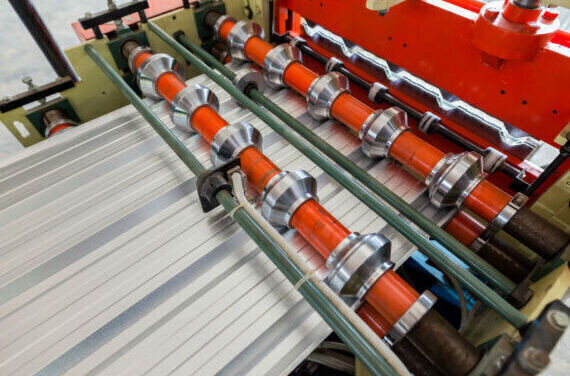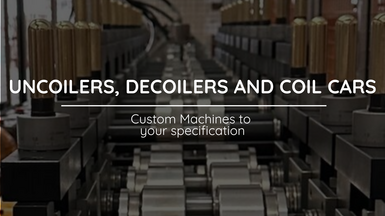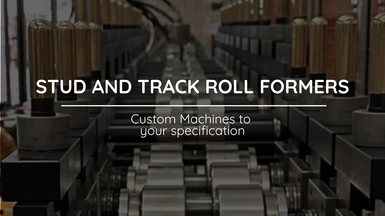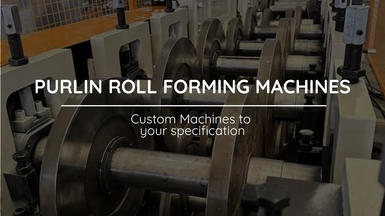
Revolutionising The Roll Forming Industry:
How Technology Will Help With Roll Forming
Posted on Monday, July 10, 2023
In today's fast-paced world, technology has become integral to various industries, and roll forming is no exception. Technology has revolutionised the roll-forming sector with its ability to streamline processes, enhance precision, and improve productivity. Let’s explore how technology integration has reshaped the roll-forming landscape, bringing forth numerous benefits and opening doors to new possibilities.
Advanced Design and Simulation Tools
One of the significant advantages of technology in the roll forming industry is the availability of advanced design and simulation tools. Computer-Aided Design (CAD) software allows engineers to easily create complex and intricate designs, eliminating the need for manual calculations and tedious prototyping. These tools provide a 3D visualisation of the roll-formed product, enabling engineers to modify and optimise before production begins. As a result, companies can minimise errors, reduce material waste, and ensure precise and efficient roll-forming processes.
Automation and Robotics
Automation has transformed the roll-forming industry, optimising production efficiency and consistency. Automated roll-forming lines equipped with robotics and programmable logic controllers (PLCs) can perform repetitive tasks accurately, reducing human error and increasing productivity. Robots can handle material feeding, part assembly, and quality inspections, enhancing overall production speed and reliability. Moreover, automation allows for seamless integration with other processes, such as material handling and packaging, creating a streamlined and efficient workflow.
Data-Driven Manufacturing
The advent of technology has paved the way for data-driven manufacturing in the roll-forming industry. With sensors and real-time monitoring systems, companies can gather valuable data throughout production. This data can be analysed to identify patterns, optimise machine settings, and detect potential issues before they escalate. Predictive maintenance can also be implemented, minimising downtime and improving overall equipment effectiveness. Data-driven insights enable companies to make informed decisions, increase productivity, and achieve higher levels of quality control.
Enhanced Quality Control
Technology has significantly improved quality control in the roll-forming industry. With the integration of advanced imaging systems and computer vision, operators can detect defects and inconsistencies more easily during production. High-resolution cameras and sensors can identify surface imperfections, dimensional variations, and other quality-related issues in real time. This allows for immediate corrective actions, reducing waste and ensuring the delivery of high-quality products to customers.
Remote Monitoring and Maintenance
Technology has also enabled remote monitoring and maintenance capabilities in the roll-forming industry. With the Internet of Things (IoT), machines and equipment can be connected to a centralised system, allowing operators to monitor performance, track production metrics, and identify potential issues from anywhere in the world. Remote access enables timely troubleshooting, reduces response time, and minimises downtime. Additionally, remote software updates and maintenance are automated, ensuring machines operate optimally and incorporate the latest advancements.
So will technology influence roll forming in the future?
In short, yes. Technology has revolutionised the roll-forming industry and will continue bringing unprecedented advancements and benefits. The integration of technology has propelled the industry forward from advanced design tools to automation, data-driven manufacturing, enhanced quality control, and remote monitoring. By leveraging these technological innovations, companies can achieve higher efficiency, accuracy, productivity, and quality levels. The roll-forming industry stands at the cusp of a technological revolution, where continued advancements will unlock new possibilities and reshape the manufacturing landscape for years to come. Embracing technology is not just a choice but a necessity for companies to stay competitive and thrive in the evolving roll-forming industry.
Roll Forming Machines LLC's New Factory
Posted on Sunday, March 23, 2025
We have relocated factories, which will be available for tours very soon.

Uncoiler, Decoiler and Coil Car Roll Forming Machine Accesories from Roll Forming Machines LLC
Posted on Sunday, November 24, 2024
Contact us today with your specifications for a custom Uncoiler, Decoiler or Coil Car at sales@rollformerusa.com or call us at (+1) (407) 859 1119

Stud and Track Roll Forming Machines from Roll Forming Machines LLC
Posted on Saturday, November 23, 2024
Contact us today with your specifications for a custom Stud and Track Machine at sales@rollformerusa.com or call us at (+1) (407) 859 1119

Cee and Zee Purlin Roll Forming Machines from Roll Forming Machines LLC
Posted on Saturday, November 23, 2024
Contact us today with your specifications for a custom Cee and Zee Purlin Machine at sales@rollformerusa.com or call us at (+1) (407) 859 1119